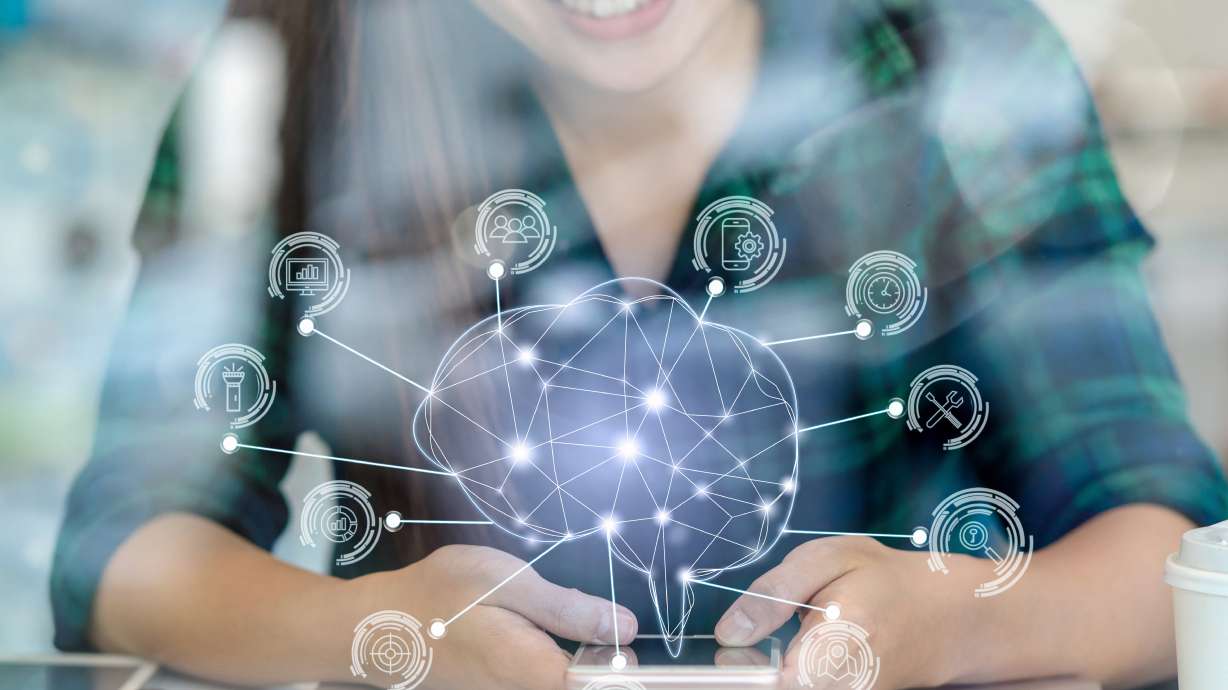Estimated read time: 5-6 minutes
This archived news story is available only for your personal, non-commercial use. Information in the story may be outdated or superseded by additional information. Reading or replaying the story in its archived form does not constitute a republication of the story.
SALT LAKE CITY — The average human's idea of artificial intelligence may come mainly from science fiction: red-eyed HAL of "2001: A Space Odyssey," the machines in "The Matrix" or the replicants from 'Blade Runner."
While entertaining, this doesn't necessarily reflect our current reality.
Tucker Hermans, an assistant professor at the University of Utah's School of Computing, wants to debunk a few myths and introduce us all to the less dystopian reality of AI.
What is AI, exactly?
AI, or artificial intelligence, makes it possible for machines to learn from experience — just like humans. An artificially intelligent machine can adjust its actions to new data and perform human-like tasks.
ai
Your Spotify or Apple Music account adjusts its song recommendations based on what you listen to, just as if you had told your friend what kind of music you liked and they recommended a few new songs to try (though your Spotify account probably has millions more recommendations).
How close is the AI of science fiction?
"I think the biggest myth we should be aware of is that super-intelligent robots are not just around the corner. While great strides have been made in developing artificially intelligent systems, these systems are highly-specific tools," Hermans said.
The automotive industry is already using several of these tools. While self-driving cars are still not widespread, things like driver assist may soon be. Driver assist helps you slow down, speed up and use a multitude of sensors to keep you driving safely — all of which are a form of AI.
Those sensors can also let drivers know when their vehicle needs maintenance and even what music they want to listen to next.
driving
You may even have AI sitting on your countertop at home. Smart speakers like Amazon's Alexa or Apple's HomePod can anticipate your requests, play the music you like and develop a shopping list. AI in an average person's home is not a robot, but a speaker or perhaps an internet-enabled thermostat or refrigerator.
"Perhaps the most pervasive ... use of AI (is) in improving voice recognition tools in smartphones and smart speakers that can learn to better recognize a specific user's voice," Hermans said.
Should I be concerned about my privacy?
In a word: yes.
"The recent success of AI has been built on large quantities of data collected on the internet. Having access to your data helps digital assistants recognize your voice better. It helps movie streaming services and online shopping sites make better recommendations for you. … The danger in all of this is some data you don't want others to have about you or your family may get collected along the way," Hermans said.
Families must decide what data they want to share and what tradeoffs they're willing to make around data. Unfortunately, the convenience of a smart speaker that can order you more milk, means someone else knows your buying habits.
Having conversations about privacy with children is the one step, so they have the opportunity to make decisions on what they want to share.
"Due in part to new laws in the European Union, online companies are starting to give you more information about what data they track and collect," Hermans said.
eu
Google's My Activity is a good place to start looking for some of that data.
What's in store for AI?
Instead of a giant and unanticipated robot uprising, the move to AI will happen more incrementally.
"I expect we will see more and more tools in our daily lives leveraging AI to try and remove some of the tedium," Hermans said. "One aspect of this I think we'll see is better intercommunication of our current apps and smart devices. For example, when I ask my smart assistant to add eggs to my grocery list, it will link with the app for my grocery store, so that I will know what aisle to pick them up from."
trends
Hermans currently works to leverage AI and robotics to create tools for individuals with mobility issues or disabilities. He hopes he'll see more of this in the future.
"Several companies have already announced small delivery vehicles designed to safely drive on sidewalks. I think, in addition to these, we will start seeing more robots in our homes to help us look in on our loved ones and pets and serve as safety and security monitors."
Where can I learn more about AI?
Hermans recommends some of the following resources to learn (and teach your kids) more about AI:
- SAS Software's complete guide to artificial intelligence
- The Complete Guide to Artificial Intelligence for Kids by Michael Milford
- The University of Utah's School of Computing summer camps through the GREAT program
- Robotics clubs like FIRST Robotics or a local LEGO robotics league
- Middle and high schools in Utah often have robotics clubs where students can build robots, participate in competitions and learn how to integrate autonomous AI behaviors with mechanical designs of new machines.









